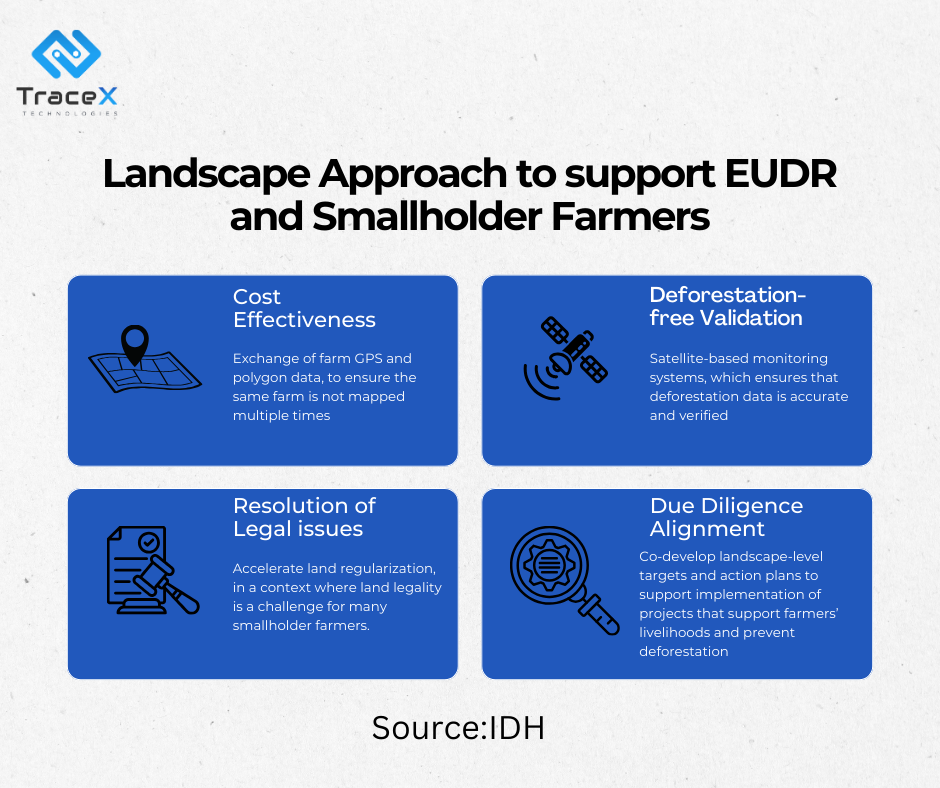Contact: +91 99725 24322 |
Menu
Menu
Quick summary: Explore the complexities and opportunities in navigating EUDR compliance for smallholder farmers. Our blog delves into the challenges they face and the potential benefits, offering insights into sustainable practices, regulatory alignment, and the transformative journey towards compliance excellence. Join us in understanding the pivotal role of smallholders in EUDR adherence and the broader landscape of sustainable agriculture.

Smallholder farmers and EUDR compliance—these words may seem daunting, but they are becoming increasingly relevant in today’s global market. The European Union’s Deforestation Regulation (EUDR) is set to impact smallholder farmers by requiring them to demonstrate that their products are deforestation-free.
About 500 million farms worldwide (84% of the total) are smaller than two hectares (ha). But they are far from homogeneous and only around 40% sell a substantial amount of their crops.
This regulation presents a significant challenge for those who lack the resources or knowledge to navigate complex supply chains. However, with the right guidance and tools, smallholder farmers can not only meet these requirements but also secure their place in the global market.
Key Takeaways
The European Union’s Deforestation Regulation (EUDR) is a landmark policy designed to curb deforestation by ensuring that products entering the EU market are deforestation-free. For smallholder farmers, this new regulation represents a significant challenge. Unlike large corporations with vast resources, smallholders often lack the technological tools, data management systems, and financial backing necessary to meet these stringent requirements.
The primary pain point lies in the complexity of proving compliance. Smallholder farmers typically operate in remote areas with limited access to the infrastructure needed for thorough product traceability. This could mean anything from verifying the deforestation status of their land to proving that their products, such as coffee, cocoa, or palm oil, do not contribute to forest degradation. Meeting these requirements is not just about adhering to new rules—it’s about overcoming barriers that many smallholders have never faced before.
Moreover, the consequences of non-compliance are severe. Failure to meet EUDR standards could result in smallholders losing access to lucrative European markets, which many depend on for their livelihoods. The loss of market access could mean financial instability, reduced income, and a significant threat to their economic survival.
Yet, this challenge also presents an opportunity. By embracing the shift towards more sustainable practices, smallholder farmers can differentiate themselves in a crowded market, command better prices for their products, and gain access to new markets that prioritize sustainability. The journey towards EUDR compliance may be difficult, but with the right support, smallholder farmers can not only meet these new standards but also thrive in a market that increasingly values environmental responsibility.
Smallholders form the backbone of the economy in many producer countries.
Smallholders’ important role in achieving sustainable development and food security is increasingly recognised in international policies such as SDG Targets.
In nations with tropical forests, smallholders, frequently comprising Indigenous Peoples and local communities (IPLCs), play a vital role in combatting climate change and preserving forests. However, they can also be contributors to forest destruction and degradation.
Deforestation and the conversion of forests by smallholders are often driven by subsistence agriculture or local markets. Additionally, these activities are linked to the production of (export) crops like cocoa, coffee, oil palm, and rubber, with some of these destined for the EU market.

Smallholders produce 95% of Vietnam’s coffee, 42% of Indonesia’s palm oil, and 95% of Thailand’s rubber.
The EU’s deforestation-free regulation (EUDR) aims to bar seven forest-related commodities and their products from the EU market if linked to deforestation. Producers and companies dealing in timber, palm oil, soy, rubber, cattle, cocoa, and coffee must provide evidence that their goods were not grown on deforested land since 2020. Compliance is required by December 2024, posing challenges for smallholders, who may lack the technical and financial capacity to meet the stringent due diligence requirements of the regulations. Finding ways to avoid small-scale producers being shut out of EU supply chains should therefore be a top priority for both exporting countries and the EU.

The intricate traceability demands may push smallholders away from participating in sustainable commodity markets.
To ensure EU policies on deforestation-free supply chains effectively recognise the rights and roles of smallholders, and addresses the underlying drivers of deforestation, the following principles must be integrated into its design and implementation:
Digital tools will play a crucial role in aiding companies and producers in monitoring deforestation and adhering to the new regulations. Mobile apps can assist traders in the vital initial phase of gathering geolocation data necessary for EUDR compliance, facilitating access to EU markets for more than millions of smallholder farmers globally. These apps promote inclusivity and transparency, with the potential for scalability to encompass other crops and regions engaged in trade with the EU.
TraceX’s EUDR compliance platform tackles several key challenges faced by smallholder farmers in meeting EU Deforestation Regulation (EUDR) requirements:
Smallholder farmers often lack the resources to navigate complex regulatory requirements. TraceX’s platform simplifies this by providing clear, actionable insights and automated compliance checks tailored to their needs.
Gathering and maintaining accurate data for compliance can be cumbersome. TraceX uses blockchain technology to streamline data collection and ensure that records are accurate, secure, and easily accessible, reducing the administrative burden on smallholders.
Implementing new technologies can be costly for smallholder farmers. TraceX’s platform is designed to be cost-effective and scalable, offering affordable solutions that fit within the financial constraints of smaller operations.
Ensuring traceability from farm to market is a significant challenge. TraceX’s platform provides a transparent supply chain view, enabling smallholder farmers to prove that their products meet deforestation-free criteria and enhancing their market access.
Compliance with EUDR can open up new market opportunities. By meeting these regulations, smallholder farmers can gain access to international markets that demand deforestation-free products, potentially increasing their revenue.
The challenges of EUDR compliance present unique opportunities for positive change and empowerment in the agricultural sector. By leveraging these opportunities, smallholder farmers can not only meet regulatory standards but also enhance the sustainability and resilience of their farming practices, contributing to a more environmentally conscious and socially responsible global supply chain.
In conclusion, while smallholder farmers face inherent challenges in navigating the complex landscape of EUDR compliance, there exist substantial opportunities for collaboration, empowerment, and sustainable agricultural practices. By addressing challenges such as limited resources, technical constraints, and potential economic impacts, stakeholders can work together to build a framework that supports smallholder farmers.
Embracing digital solutions, fostering inclusivity, and providing tailored support are integral steps in ensuring that these farmers become active contributors to deforestation-free supply chains. The opportunities lie in transforming challenges into avenues for growth, resilience, and the creation of a sustainable agricultural ecosystem that benefits both smallholder farmers and the global commitment to combat deforestation. Through collective efforts, the journey towards EUDR compliance can become a catalyst for positive change, aligning the goals of environmental conservation with the livelihoods of those at the heart of agriculture—our smallholder farmers.
Smallholder farmers encounter several challenges in meeting EUDR compliance, including limited access to resources and technology, difficulty in maintaining accurate and comprehensive data, and the high costs associated with implementing new systems. Additionally, navigating complex regulatory requirements can be daunting for farmers with limited technical expertise and support.
TraceX’s EUDR compliance platform helps smallholder farmers by simplifying the compliance process through user-friendly interfaces and automated compliance checks. The platform utilizes blockchain technology to ensure accurate data collection and secure record-keeping, making it easier for farmers to meet regulatory requirements. It also provides training and support to help farmers understand and use the technology effectively, reducing the burden of compliance.
EUDR compliance presents several opportunities for smallholder farmers, including access to international markets that require deforestation-free products. By meeting EUDR standards, smallholder farmers can enhance their marketability and potentially increase their income. Additionally, compliance can foster sustainable agricultural practices and improve overall farm management, contributing to long-term environmental and economic benefits.
